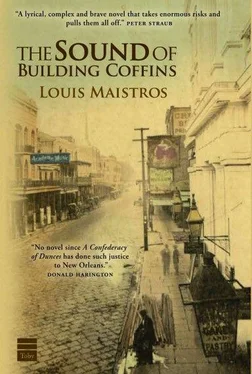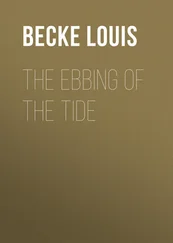
Louis Maistros
The Sound of Building Coffins
© 2009
“The river starts like a spring and the story just came out. The river starts like a spring and he’s like a newborn baby, tumbling and spitting, and one day, attracted by a puddle, he starts to run. He scurries and scampers and wants to get to the marsh, and, after being followed by a big bubble, he does, and at the end of the run he goes into the meander. Then he skips and dances and runs until he’s exhausted, and he lies down by the lake-all horizontal lines, ripples, reflections, God-made and untouched. Then he goes over the falls and down into the whirlpool, the vortex of violence, and out of the whirlpool into the main track of the river. He widens, becomes broader, loses his adolescence, and down at the delta, passes between two cities. Like all cities on the opposite sides of the deltas, you can find certain things in one and not in the other, and vice versa, so we call the cities Neo-Hip-Hot-Cool Kiddies’ Community and the Village of the Virgins. The river passes between them and romps into the mother-Her Majesty The Sea-and, of course, is no longer a river. But this is the climax, the heavenly anticipation of rebirth, for the sea will be drawn up into the sky for rain and down into wells and into springs and become the river again. So we call the river an optimist. We’ll be able to play the ballet in any church or temple, because the optimist is a believer.”
– Duke Ellington
“Medicine, to produce health, must examine disease, and music, to create harmony, must examine discord.”
– Plutarch
New Orleans
1891
Chapter one. Deliver the Children
The short legs of the mulatto boy pedaled the rickety bicycle southeasterly down the bumpy, ballast-stoned streets of the French Quarter. A burlap bag, full of fresh fetuses, sat loosely at the center of a chicken-wire basket tied between handlebars. As the cobbled surface of Customhouse Street gave way to the rocky dirt of the levee, the bicycle slowed and sudden turbulence bounced the contents of Typhus’ burlap sack. Easy does it , thought Typhus. Should have tied those babies in, he knew, but Doctor Jack had run out of twine. Simple problem, simple solution: Easy does it. That’s all. See that? Easy. The bouncing diminished accordingly and the bag did not jump, fall, or spill. Typhus’ children stayed with him.
Typhus Morningstar was only nine years old, but older of eye.
Old enough to have suffered some, but young enough to know there are easy solutions to most types of suffering; solutions not too difficult to grasp and quick enough to be done with if a person had half a mind to. Typhus often considered the possibility that when a boy or a girl reached a certain age of maturity (or reached a certain physical height) that simplicity itself became a thing not to be trusted. Pain for grownups is easy enough to feel-their problem lies in the whys, hows and what-nows that always accompany such pain. Simple questions are bound to yield simple answers, but also; a thing too easy often feels like a trick. Typhus hoped never to reach the age (or height) of a person who could only trust the harder, more complex ways of handling life’s trials.
Typhus maneuvered up the side of the levee, then down the slope towards the river, where the water’s recurring kiss had hardened and smoothed the sand into a firm, grainy mud. It was tougher to pedal here, but a smoother ride. He felt safer on this side of the sloping embankment anyway, beyond eye and earshot of the busybodies and shady nighttime characters who roamed the Quarter when the sun was down and gone. It wasn’t unheard of (or even uncommon) for a tan-colored boy with a package to be stopped by harbor police for no good reason at all.
Plus, it was so much prettier this near the river.
He followed the slow curve of the riverside until it ambled him up and onto the boardwalk that ran alongside the docks. The only light here was of the moon, bouncing off the water like a million lemon slices, shimmering and shining but yielding no useful illumination. Smudge pots bobbed atop buoys fashioned from beer barrels fifty yards offshore, warning ships of sandbanks too high for safe docking. Thick, black smoke from burning pitch-its powerful smell equally loathsome to man and mosquito-etched creases in the coal sky, quietly proclaiming that there’s always something blacker. Only the fatigued crews of smaller vessels dared navigate between the hidden sandbanks, but even these few vessels seemed void of living beings tonight. Every porthole of every ship: black, black, black.
It was all so peaceful and still here.
Typhus loved his midnight bicycle rides. The sound of the water, the feel of night air against his skin, and the acrid smell of burning tar; it all conspired into a comforting sense of oneness with his father’s God. And that’s all his child’s heart had ever really pined for. Not much else, anyway.
A block or so ahead, the shadow of a man cast long from the end of a narrow pier. The dark shape jerked grotesquely as Typhus rode past, sending a sweeping wave of warm gray across the river’s yellow-sparkly surface. Typhus smiled and waved back to the elderly gentleman known to most as Marcus Nobody Special. He wished he could stop and talk to Mr. Marcus, but he had business to tend. Maybe after-but most likely, he’d be too tired to socialize after the errand. The business of the errand always took a lot out of him.
Mr. Marcus, who’d been caretaker of the Girod Street potter’s field since before the War of the States, had either buried or overseen the burying of just about every man, woman and child of color who’d died in the last fifty years around here. Mr. Marcus was seventy if he was a day, but never complained of aches or pains and always spent the nighttime fishing off the longest pier at this particular stretch of levee. It seemed the old man never rested or slept at all.
Most of the locals thought Marcus crazy. Some even thought him a ghost, people saying he’d died, buried his own bones and come back; that he was on some kind of mysterious mission to find a particular fish that would let him go back to the grave in peace. That fish, they said, had stolen Marcus’ soul.
But Marcus seemed alive enough to Typhus. The old fellow ate, drank, pissed, and laughed just like every other living person Typhus knew. So the one part was a lie, but he knew the other was true enough: Mr. Marcus did have a certain odd obsession with fish. Typhus had had occasion to sit alongside the old man on a few of these queer fishing expeditions, had even seen Marcus catch himself a perfectly good catfish now and then-only to throw it back in the water after a cursory examination. He’d simply shake his head and apologize to the wiggly, fat thing, saying; “Sorry, old man, didn’t mean to interrupt yer nightswimmin’.” Then he’d shake his head some more and say to himself, or to whoever was standing nearby:
“Not my dern fish. Not my fish at all. But I’ll get ’im. Yessir.”
Typhus liked Mr. Marcus very much. His behavior might not have made the plainest sort of sense, but Typhus understood as much as he needed to. No use being greedy about understanding people other than yourself. He figured people have a right to some privacy concerning the strange workings of their own minds.
Up ahead a hundred yards or so, Typhus spotted his destination. A morass of banana plants interwoven with tall, swaying saw grass signaled the presence of a large sandbank-turned-island just beyond the pier. People sometimes used the little island for fishing during daytime hours, but at night it was Typhus’ spot.
Читать дальше













